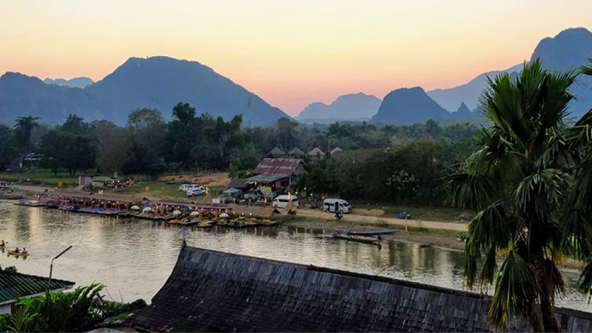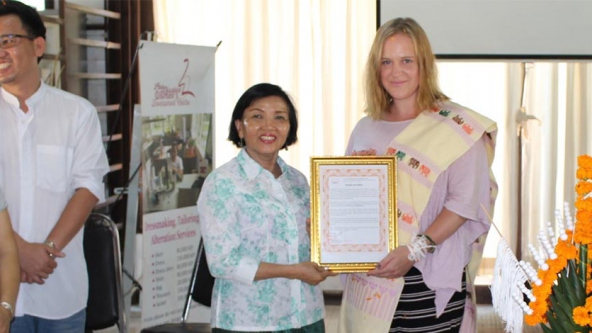The International Exchange (TIE) connects people from the private sector with social initiatives around the world. We asked CEO and founder Philippa White to tell us how TIE got started, and her hopes for the future.
How did TIE get started?
My immediate family works in what I would call the ‘helping people industries’: namely doctors, social workers, environmental engineers, public health professionals. You get the idea.
When we would meet up, everyone would share experiences and talk about their work. I would hear from family members helping to roll out antiretroviral programmes in South Africa, implementing patient safety initiatives at hospitals in Canada, and looking at how to improve water management in developing countries. To name just a few.
And then there was me, the one who worked in the private sector. On one particular occasion, I really struggled to contribute to the conversation (which if you know me, doesn’t happen very often!). I felt, for lack of better words, unworthy, and found myself questioning why I had chosen to do what I do.
But I hated the feeling. I loved what I did. And I didn’t like the idea that all of us had two choices in life – to either do good, or work for companies that make a profit.
I knew just how important, how valuable, often how crucial, the skills of the private sector can be, and I was determined to find a way for the sector to apply its power to make a difference.
And with that thinking, The International Exchange (TIE) was born.
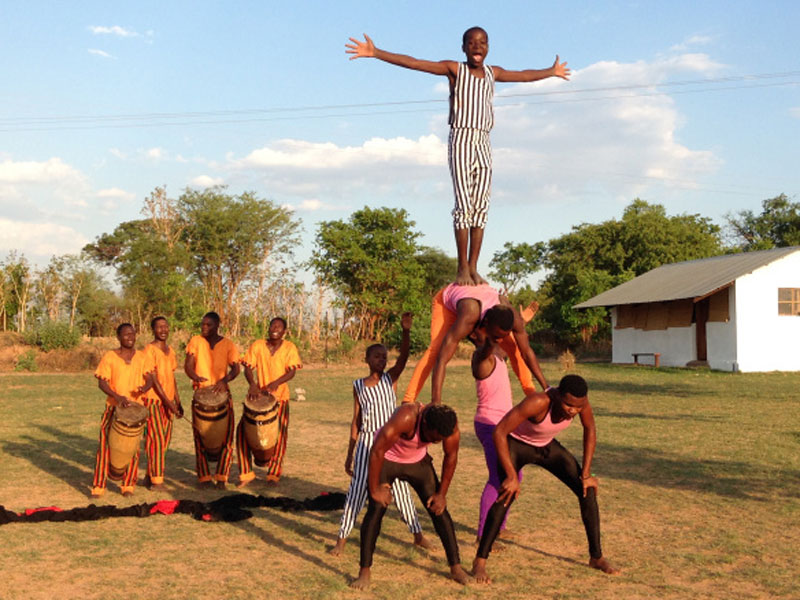
What’s TIE’s mission?
We’ve got a few things that we’re keen to do with TIE:
- Unleashing human potential
- Using professional skills to make a difference
- Changing the face of the private sector
First and foremost, we want to create inspiring, mind-opening leadership development opportunities for professionals.
The way we do this is to shake people up a bit. Challenge them. Get them working in far-off lands out of their comfort zone, with people they have never worked with before, often in a foreign language.
Doing this means they have to draw on skills and knowledge they have developed over time, but don’t use every day, with limited resources at their disposal.
They end up seeing things differently, much more aware of their potential, and they come back to their company as a force to be reckoned with.
Second, we want to provide professionals within businesses around the world with the opportunity to apply their hard-earned skills to make a mark on the planet.
On TIE, professionals are asked to develop campaigns, strategies, financial plans, business plans or create research pieces for social projects, social enterprises or non-profits.
Not only do these projects make a tremendous difference to the organisations and local communities alike, but the experience also helps the professionals realise just how powerful their skills are. They really can use their professional knowledge to help change the world.
Third, we believe that the private sector is incredibly powerful and that it can change the world, for the better.
We want professionals to feel proud of their chosen profession, the skills that they have and realise the power they have to make a positive impact with every single project they work on, every day.
Through the TIE experience, we hope to inspire the future leaders of the commercial world to think differently, to approach their work differently and more sustainably, and in turn, change the way the sector works, behaves and thinks from the inside, out.
What type of activities do you do?
We place talented professionals to work with social initiatives all around the world for short-term placements. We work with a host of different organisations around the world, and we are constantly on the look-out for new organisations that inspire us.
If you know of any, do get in touch!
The range of causes that we support varies immensely from HIV/AIDS, education, human rights, children’s rights, ecology and the environment to street children and much more.
We match participants to a project that fits with their personal, professional and company objectives, and placements in the country last (on average) for a total of 30 days.
We often suggest a person arrives a couple of days before the placement starts, and allow one day on the back-end.
But don’t get confused. TIE is an intensive programme that runs from about three to twelve months in total, depending on when the participant goes abroad, but the total time out of the company is limited to about 33 days.
There is a lot that happens before they head off.
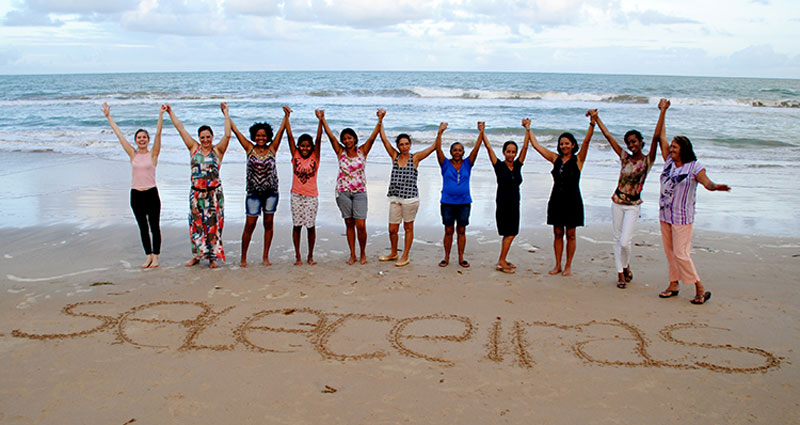
How did your relationship with Octopus Giving come about?
We were put in touch with Simon Rogerson via Harry MacAuslan (one of our advisers) a couple of years ago.
Simon and I had a chat, and we both felt that there was a real synergy there. I adored our conversation, and it was clear that TIE was a great fit for Octopus Giving right from the get-go.
Octopus doesn’t like the status quo and is keen to do things differently. You look at the world and want to see how to make things better. You are looking to change today for a better tomorrow. And so are we.
Since that initial conversation, we have sent two Octopus employees on TIE placements, in Malawi and Brazil, and the results were incredible on many levels.
Octopus has four more volunteers heading out on placements in early 2019, and we can’t wait to share the stories with you.
What are you most proud of?
What we’re most proud of is that after every single TIE placement, the volunteers come back more confident, aware of their skills and understanding of what they do for a living, and injected with an energy that has them beaming.
TIE changes people’s lives for the better, in more ways than one, and I can’t tell you how proud I am to have made that possible.
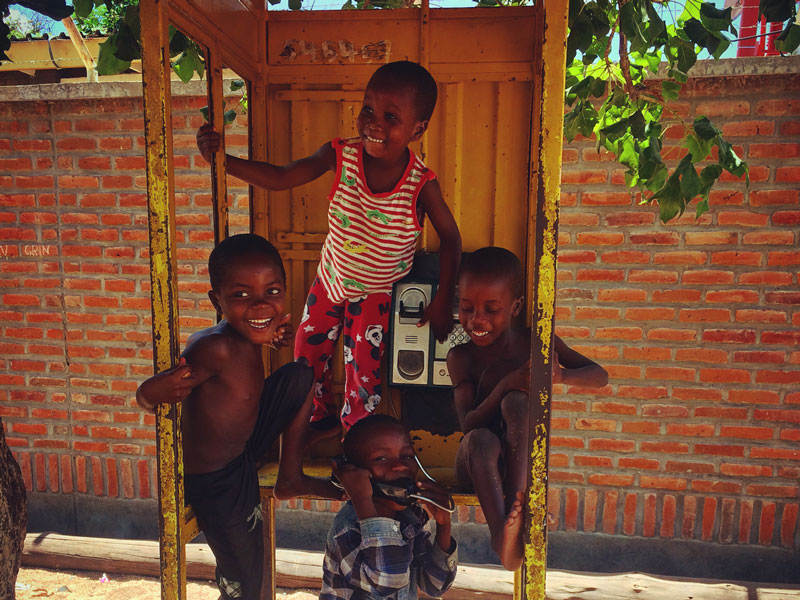
What things do you worry about?
I want to ensure every placement is a success and runs as smoothly as possible, and I worry about the minute details before each one.
But looking broader than TIE, and on a grander scale, what is worrying me today is how on earth people like Trump or Brazil’s Bolsonaro got into power. And what that means for our planet.
We need more people to look out for minority groups and to protect the environment. We need more tolerance, less violence, and more understanding. This is a critical moment where we need to protect our human rights, the environment and democratic values.
What strategic projects are you working on right now?
In the first four months of 2019, we will have nine different projects happening all across the globe. We’re really excited about the range of issues our participants are going to be working on, and we’re in the process of getting these projects written and firmed up.
Here’s a taste of what is in store:
- Mika Singh from WPP will be supporting the Marine Megafauna Foundation with its marine conservation efforts in Mozambique.
- Amy Kilty from Wieden+Kennedy London will help the Kasiisi Project market its guesthouse in the Kibale National Park in Uganda, giving tourists access to a unique travel experience and raising awareness of environmental and educational issues in the region.
- Susan Min from Y&R is going to Brazil to bring the work of SomosProfessores, a platform for public school teachers, to the next level.
- Felicia Kodderitzsch from Octopus Labs will be using her analytical skills in Myanmar, helping Prospect Burma provide scholarships to even more Burmese students.
What makes you positive about the future?
I have worries, but I promise you, I’m very optimistic about the future. We are so lucky to work with such forward-thinking people, companies and organisations around the world.
Each project and placement gives us an insight into just how inspirational everyone and every company and organisation is.
I’m also positive that so many people are working tirelessly in so many different ways, and in different sectors, to make the world a better place.
If we look at what’s happening on a macro scale, violence in the world, overall, is in decline and as prosperity spreads, civilisation should continue to be more peaceful.
I find comfort in the fact that the world is getting more and more connected, and we are coming together more and more to work on issues that matter, so more solutions to pressing problems are emerging from connected minds.
Renewable energy is now becoming more efficient and is starting to pay off. Remarkable breakthroughs are being made to help solve some of the major challenges we face around water, health and climate change.
TIE is all about connecting the third sector with the private sector. And the results, just from our projects, are huge. On TIE, and through our networks, we are seeing a global mindset emerging where we realise we’re all in this together. It’s really exciting!
It’s up to all of us to find the solutions to the world’s most pressing problems, rather than leave it to someone else to figure out.
What would help get you closer to achieving your mission?
TIE really is a win-win for everyone involved. Every company that signs up to TIE means many more professionals that go on placements.
This results in many more communities and people impacted in developing countries, and many more companies positively impacted once their professionals return.
How can people get involved with TIE?
If you work for a company, and you have the desire to use your skills in a completely new way, you should definitely consider TIE.
We take leaders from different industries, companies and disciplines. They can work in advertising, marketing, financial services, law, publishing, events, PR, creative services, design, planning, branding, digital, production… the list goes on.
A placement with us will help you to move ahead in your role and at your business, to learn new insights and ways of working in a real-time business environment, and give you the opportunity to make a difference with your skills and change the world. Get in touch and we’ll explain further.

